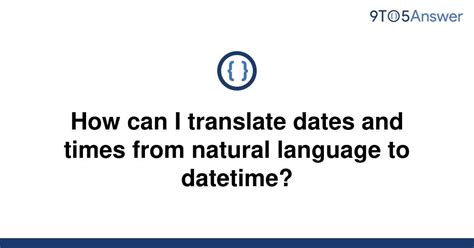Are you tired of endlessly struggling to correctly input dates and times for your business’s records? Have you ever wished for a more effortless way to convert natural language into accurate datetime? Look no further, because this article provides the solution you’ve been seeking.
Effortlessly converting natural language to datetime not only saves time, but it also ensures precision in timekeeping. Whether you’re dealing with international clients or have to meticulously document events with time stamps, having a reliable system in place can make a world of difference. The process outlined in this article allows for seamless conversion without sacrificing accuracy or convenience.
Don’t settle for manually inputting dates and times, risking errors and wasting valuable resources. By incorporating the strategies in this article, you can streamline your timekeeping process and focus on what really matters: running your business. So, read on to discover the effortless way to convert natural language to datetime for accurate timekeeping.
“How Can I Translate Dates And Times From Natural Language To Datetime? [Closed]” ~ bbaz
The Struggle of Timekeeping
Accurate timekeeping is crucial for many industries and tasks, from scheduling appointments to creating financial reports. However, inputting timestamps manually can be time-consuming and prone to errors. Luckily, there are tools available to convert natural language to datetime for efficient and accurate timekeeping.
Natural Language Processing
Natural language processing (NLP) is a subfield of artificial intelligence that focuses on understanding human language. NLP algorithms can analyze text inputs and extract relevant information, such as dates and times. This technology has been especially useful in developing tools for effortless datetime conversion.
Manual Timestamp Entry vs. Natural Language Conversion
| Method | Pros | Cons |
|---|---|---|
| Manual Timestamp Entry | – Complete control over format – Familiar method for some users |
– Time-consuming – Prone to errors – Intimidating for new users |
| Natural Language Conversion | – Quick and effortless input – Reduced chance of errors – Familiar language processing for many users |
– Limited control over format – Potential ambiguity in language interpretation |
Tools for Efficient Datetime Conversion
Several tools are available to help users convert natural language to datetime with ease:
Google Calendar
Google Calendar allows users to input events through natural language, such as Lunch meeting with John at noon tomorrow. The tool automatically detects and converts this input to the correct datetime format.
Chronic
Chronic is a Ruby library that parses natural language into datetime objects. Users can input phrases such as tomorrow at 3pm and receive the corresponding datetime object.
Wit.ai
Wit.ai is an NLP platform that offers a datetime extraction feature. Developers can integrate this feature into their applications for effortless datetime conversion.
Advantages of Natural Language Conversion
Switching to natural language conversion can offer several benefits:
Time Savings
Natural language conversion reduces the time needed to input datetime information, freeing up users’ time for other tasks.
Reduced Errors
Manually inputting timestamps can lead to typos or formatting errors, which may cause problems down the line. Natural language conversion eliminates these issues.
Efficient Cross-Platform Use
Many tools that incorporate natural language conversion, such as Google Calendar, can be used across multiple platforms, including mobile devices and web browsers, making them accessible to users on-the-go.
Conclusion
Effortlessly converting natural language to datetime is a powerful tool that can save time, reduce errors, and improve productivity. While it may take some introduction for those who are used to manual timestamp entry, incorporating this technology into standard practices can greatly benefit organizations and individuals alike.
Thank you for taking the time to read this article about effortlessly converting natural language to datetime for accurate timekeeping. We hope that you found it informative and valuable, and that you can use these tips in your own work or personal life.
As we have discussed, converting natural language to datetime can be a tricky process, but it is essential for accurate and efficient timekeeping. By using tools like python’s dateutil library or Google’s natural language processing API, you can save time and ensure that your data is always up-to-date.
If you have any questions or comments about this topic, please feel free to leave them below. We always appreciate feedback from our readers, and we are happy to help with any issues you may encounter. Thank you again for visiting our blog, and we hope to see you again soon!
Effortlessly Convert Natural Language to Datetime for Accurate Timekeeping
- What is natural language processing?
- How does NLP help with converting natural language to datetime?
- What are some common applications of NLP for datetime conversion?
- How accurate is NLP-based datetime conversion?
- What are some challenges of NLP-based datetime conversion?
Natural language processing (NLP) is a field of computer science that deals with the interaction between computers and humans using natural language.
NLP algorithms can identify patterns in text that indicate a date or time, and then convert that information into a structured datetime format that can be easily used for timekeeping.
NLP is commonly used in chatbots, virtual assistants, and other AI-powered tools that need to understand human language and respond accordingly. It can also be used in data analysis, where natural language dates and times may be included in unstructured data sets.
The accuracy of NLP-based datetime conversion depends on the quality of the data being analyzed and the sophistication of the NLP algorithm being used. However, with the right tools and techniques, it is possible to achieve high levels of accuracy and reliability.
Some challenges include dealing with ambiguity in natural language, handling different date and time formats, and understanding cultural differences in how dates and times are expressed.




